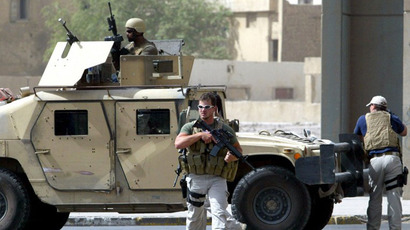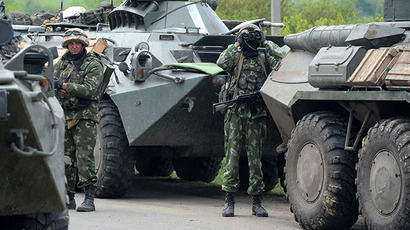Blackwater Iraqi chief threatened to kill US govt. inspector - newspaper
A senior official of the notorious private security company Blackwater allegedly threatened to kill a government investigator probing the firm’s Iraqi operation. The US embassy sided with him and forced the inspector to cut the visit short.
The shocking insight into the relations between the US State Department and the company hired to protect government employees in Iraq wasreported by the New York Time on Sunday. The newspaper cites documents which were turned over to plaintiffs in a lawsuit against Blackwater, including a memo describing the incident submitted by the investigator, Jean C. Richter, to his superiors in Washington.
Diplomatic Security special agent Richter was part of the two-man team together with State Department management analyst Donald Thomas Jr. that arrived in Baghdad on August 1, 2007 to inspect Blackwater operations in the country. The company was awarded a $1 billion contract to provide security for the State Department and the CIA in Iraq.
According to the documents, the investigators found numerous violations, including changing of security details without the State Department’s approval, reducing the number of guard details and storing of automatic weapons and ammunition in Blackwater employees’ private rooms. There were also discipline problems, with guards having parties with heavy drinking and female visitors, including one episode in which an armored Blackwater car was requisitioned by four drunken employees, who drove to a private party and crashed the $180,000 vehicle into a concrete barrier.
As the probe continued, apparently it irritated some people in power in Iraq. On August 20, Richter was summoned by the embassy’s regional security officer, Bob Hanni, who said he had received a call asking him to document Richter’s “inappropriate behavior.” The investigator contacted Washington and was instructed to take his partner to all remaining meetings.

The next day Richter and Thomas met Daniel Carroll, Blackwater’s project manager in Iraq, to discuss a complaint over food quality and sanitary conditions at a cafeteria in Blackwater’s compound. Carroll said Richter could not tell him what to do in his cafeteria and went on to threaten him.
The Blackwater chief said “he could ‘kill me’ at that very moment and no one could or would do anything about it as we were in Iraq,” Richter recounted in the memo. “I took Mr. Carroll’s threat seriously. We were in a combat zone where things can happen quite unexpectedly, especially when issues involve potentially negative impacts on a lucrative security contract.”
Thomas corroborated Richter’s account of the events in a separate statement, saying that Carroll’s comments were “unprofessional and threatening in nature.” He added that the investigators were told by people in Baghdad to be “very careful,” considering that their review could jeopardize Blackwater’s operations there.
Richter said the company officials showed little respect either to State Department officials like himself or to FBI agents present in Iraq.
“To me, it was immediately apparent that the Blackwater contractors believed that they were the de facto authority and acted accordingly, in an alarming manner,” the memo said. “Blackwater contractors saw themselves as ‘above the law’ and actually believed that they ‘ran the place’.”
Just a reminder, while you're reading that Blackwater piece: the Obama Administration is actively trying to imprison the guy who wrote it.
— Russell Brandom (@russellbrandom) June 30, 2014
He said he was shocked when the US embassy in Baghdad sided with Carroll and ordered the two investigators to leave Iraq immediately. In an August 23 email, Ricardo Colon, the acting regional security officer at the embassy, told Richter that their mission had become “unsustainably disruptive to day-to-day operations and created an unnecessarily hostile environment for a number of contract personnel.” The next day the inspectors cut short their probe and left Baghdad.
“The management structures in place to manage and monitor our contracts in Iraq have become subservient to the contractors themselves,” Richter stated in the memo.
The events happened just weeks before Blackwater guards killed 17 civilians, including a nine-year-old boy in Bahgdad’s Nisour Square on September 16, 2007. The incident sparked outrage with American presence in Iraq among the local population. The US is currently trying to prosecute four of the five guards involved in the incident after a first failed attempt to do it in 2009.
Blackwater was founded by former Navy SEAL Erik Prince and grew to a private security giant with billions worth of contracts from the US government. After a series of scandals marred the company name, Prince sold it. Blackwater was renamed three times eventually merging with its competitor Triple Canopy to form what is now called Constellis Holdings.














